- Home
- Hermann Hesse
Hymn to Old Age Page 8
Hymn to Old Age Read online
Page 8
It had not occurred to either of us to tackle one awkward subject that was perfectly familiar to both of us and would have ruined the conversation and rendered all our decisions illusory. We had negotiated with each other straightforwardly and in good faith—indeed with too much good faith. And yet Lorenzo knew just as well as I did that this conversation, with all its plans and good intentions, would not remain in his memory or in mine, and within a fortnight at most we would both have forgotten every single word months before the times set for the rebuilding of the compost heap and the expansion of the strawberry beds. Our morning chat beneath a non-rainy sky had taken place purely for the sake of talking—a game, a divertimento, a totally aesthetic activity that would have absolutely no consequences. It had been sheer pleasure for me to gaze for a while into Lorenzo’s dear old face and to be the recipient of his diplomacy, which established a protective wall of the most delicate courtesy between himself and his interlocutor, without ever taking the latter seriously. As contemporaries, we also have a feeling of fraternity towards one another, and when one of us is limping particularly badly, or is having extra difficulties with his swollen fingers, although we don’t actually talk about it, the other will smile understandingly with a slight feeling of superiority, and on this occasion will experience a certain satisfaction based on a sense of solidarity and sympathy in which he is not displeased at being temporarily the more robust of the two but, at the same time, is made to think with anticipatory regret of the day when the other will no longer be standing there beside him.
From Notizblätter um Ostern
(Notes at Easter) 1954
MAXIM
To all things you should be
Brother or sister true
So they merge into a ‘we’
And not a ‘me and you’.
No star, no leaf should fall
Without your falling too.
They’ll rise up one and all
Each hour, and so will you.
AUTUMN COMES EARLY
The pungent smell of dead leaves fills the air;
The cornfields now are desolate and bare.
We know that when the wild winds come to play
They’ll blow our weary summer on its way.
The gorse bush crackles. Suddenly it will see
That all the things we think we’re holding fast
Have faded to a dim and distant past
And every flower was just a wondrous dream.
The frightened soul sends out this wish to me—
That to the present it should cease to cling
That it should face its fading, like a tree
That autumn too its festive fare might bring.
[THE FRENZY OF THE BOOM
AND THE FEVER OF PROPERTY
SPECULATION]
WHEN, AFTER A WORLD WAR and many personal misfortunes, I came to Montagnola forty years ago, shipwrecked but ready to battle on and start afresh, it was just a sleepy little village in the midst of vineyards and forests of chestnut trees. And that was how it remained for many years. Until our hill also found itself in that state—or that sickness—which Knut Hamsun has described with such uncanny vividness in Children of the Age and Segelfoss Town. Where yesterday a whimsically winding path had climbed the slope and disappeared among rows of vines and honeysuckle hedges, today above the churned-up mounds of earth one could see lorries stopping and discharging their loads of bricks and their bags of cement, and then a little later, instead of wildflowers, vines and fig trees, there were wire fences with shrill-coloured little suburban houses behind them. Creeping up from the town and the valley, getting relentlessly closer and closer to us, came building plots, new houses, streets, walls, cement mixers, the frenzy of the boom and the fever of property speculation. It was the death of the forest, the meadows, the vineyards. The machines of the building industry rumbled and roared, and the riveting hammers banged on the oil tanks. No one could object—the people were in the right; decades ago I too had fenced off a piece of land, had planted a hedge round it and had built a house and a garden and paths. Of course at that time I was not one of the ‘children of the age’ so much as an individual eccentric who settled down far from the village, planted trees, battled against the weeds and looked down somewhat scornfully on the town and its little suburbs. The scorn had long since faded, our little village had turned into a Segelfoss town, and house by house, street by street it grew bigger, shops were opened or extended, there was a new post office, a café, a newspaper kiosk, a hundred new telephone connections, and our former walks disappeared, as did my hidden painting spots and resting places from my Klingsor time. The great wave had reached us, and ours was no longer a village, and our surroundings no longer the countryside. And no matter how remote and hidden our house had been when we built it nigh on thirty years ago, now the surge was lapping at our feet, and field after field was sold, plotted, built on and fenced off. We were still protected by our situation on the steep slope and on a rough and narrow track, but the terraced fields below our property, with their few vineyards and trees and their picturesque old stable, were already attracting prospective buyers, some wanting to build and others to speculate, and every so often one could see strangers clambering around, testing, contemplating the view, pacing here and there to measure distances. Tomorrow or the day after, these remnants of tranquillity and nature would be taken from us. And it wasn’t just a matter of us two old folk and our peace and quiet, but also of that which our lords and masters had built, planted and established here and had left to us as their vassals, and of that which now we would assuredly no longer be able to give back as we had found it.
From Bericht an Freunde
(Report to Friends) 1959
The world does not give us very much now; it often seems to consist of nothing but noise and fear, and yet grass and trees still grow. And if one day the whole world should be covered with concrete boxes, the clouds will still be playing up above, and here and there people will still, with the help of art, be holding open a door to the divine.
From an undated letter
LADY WORLD, FAREWELL
In shreds the world’s now lying
Though once we loved her dear
But now the thought of dying
For us holds little fear.
She should not feel our rages
So wild and bright is she
And the magic of the ages
Still colours all we see.
But gladly we’ll be leaving
Her game. We’ll say adieu
To all the joy and grieving
To all the loving too.
Lady World, farewell now
Be young and lovely still
But of your heaven and hell now
We have had our fill.
Of course one must differentiate between the resignation of the tired old man, who no longer has much interest in the world, and the actual, innermost beliefs of that old man. The tiredness after all is only something physiological, and if I am happy to leave this present world with all its stench, that does not mean that I despair of the world and humankind now and for ever. I sense destruction and I see the ugliest things approaching, but they will also come to an end, and in a world that has been totally destroyed, everything good for which man has the potential and the desire may blossom once again.
From a letter written in
October 1951 to Georg Schwarz
There is no loftier spectacle than the man who has become wise and has thrown off the shackles of the temporal and the personal.
From an undated letter
SOMETIMES
Sometimes when the wind is howling
Or a songbird sings its song
Or a dog barks in the distance
I stay still and listen long.
My soul flies back a thousand years
To a past long left behind
When the singing bird and the howling wind
And I were brothers, all one kind.
<
br /> My soul’s an animal, a tree
A cloud that’s drifting in the sky.
A stranger, changed, it now returns
And asks me. How should I reply?
[A CALL FROM BEYOND
CONVENTION]
RECENTLY A YOUNG MAN who wrote to me addressed me as “old and wise”. “I trust your judgement,” he wrote, “because you are old and wise.” I was in the midst of one of my brighter moments, and instead of reading the letter—which, incidentally, was very similar to hundreds that I get from other people—in every detail, I fished out the odd words and sentences from here and there, looked at them as closely as possible, and asked them exactly what was their essential meaning. “Old and wise” stood there, and that might make a tired and grumpy old man laugh, who throughout his long and rich life had very often thought he was immeasurably closer to wisdom than he was now, in his reduced and none too cheerful condition. Old, yes, that I was, it’s true—old, worn out, disillusioned and tired. And yet the word ‘old’ could also express something completely different! When we talked of old tales, old houses and towns, old trees, old communities, old forms of worship, there was absolutely nothing belittling, derogatory or disdainful in the term. And so even the qualities of age were something I could only partially attribute to myself—of the many meanings of the word, I was inclined to accept and apply to myself only the negative ones. But for the young correspondent, for all I knew the word ‘old’ could have a picturesque, grey-bearded, gently smiling, partly moving, partly venerable value and sense—at least it had always had these associations for me in the days when I myself was not old. All right, then, one could accept the word, understand it and respect it as a mode of address.
But now for the word ‘wise’! Well, what exactly was it supposed to mean? If what it was supposed to mean was a nothing—just a general, vague, conventional epithet, an expression, then one could leave it out altogether. But if it wasn’t a nothing, if it really was supposed to mean something, how was I to delve down into this meaning? I recalled an old method that I’d often used before—namely, that of free association. I had a little rest, walked round the room a few times, said the word ‘wise’ out loud again, and waited for the first idea to come into my head. Lo and behold, what arrived was another word—Socrates. Anyway, that was something, and it wasn’t just a word, it was a name, and behind the name was not an abstraction but a figure, a person. So what did the flimsy concept of wisdom have to do with the substantial, very real name of Socrates? That was easy to spot. Wisdom was the quality that school and university teachers, famous people lecturing in overflowing halls, authors of leading articles and feature pages invariably latched onto first, the moment they mentioned Socrates. Socrates the Wise. The wisdom of Socrates—or, as the learned lecturer would say, the wisdom of a Socrates. There was nothing more to say about this wisdom. But no sooner would one have heard the expression than no doubt there would arise a reality, a truth—the real Socrates. A truly mighty and, despite all the legends draped round him, a truly convincing figure. And this figure, this old Athenian with the nicely ugly face had provided unmistakable information about his own wisdom, because he had expressly and emphatically announced that he knew nothing, absolutely nothing, and had absolutely no claim whatsoever to the attribute of wisdom …
And so there I stood, a wise old man, before the unwise old Socrates, and must either defend myself or feel ashamed. There was more than enough reason to be ashamed, because regardless of all the fiddling and the hair-splitting I knew perfectly well that the young man who had called me wise had by no means done so out of stupidity or youthful innocence, but that I had given him the opening, had seduced him, had more or less authorised him to do so through my literary writings—in which something like experience and reflection, something like a lesson and the wisdom of age might be sensed—and although, I believe, later on in my state of doubt I had put most of my literary ‘pearls of wisdom’ in quotation marks, or even changed or rescinded them, nevertheless when all is said and done I had throughout my life and work said yes more often than no, accepted or kept quiet instead of fought, and all too frequently paid my respects to the traditions of the mind, of faith, of language, of convention. In my writings, it was undeniable that one could sense here and there a glimmer of light, a break in the clouds and in the drapery of the traditional altarpiece, a crack behind which there was some threatening, ghostly, apocalyptic vision—the occasional suggestion that man’s most secure possession was his poverty, and his most actual bread his hunger; but all in all, like everyone else I had preferred to embrace the beautiful worlds of form and tradition, and had chosen to walk in the gardens of sonatas and fugues and symphonies rather than those of the apocalyptic fiery furnaces, and I had opted for the enchanting games and comforts of language rather than for all those experiences in which language comes to an end and turns to nothingness because, for a terrifying or beautiful, perhaps blessed or perhaps fatal moment, we are confronted by the inexpressible, the unthinkable, the very heart of the world, which can only be glimpsed as a mystery or as a wound. If the young letter-writer had seen in me, not an ignorant Socrates but a wise man in the sense of the professors and the critics, then by and large I had indeed given him the right to do so …
This analysis of the words “old and wise” had therefore been of little use. Now, in order somehow to have done with the letter, I took the opposite route and instead of looking to gain enlightenment from various individual words, I turned to the content, for the overall purpose of which the young man had written his letter. This purpose was a question—an apparently very simple question, and therefore conducive to an apparently very simple answer. The question was: “Does life have a meaning, and would it not be better to put a bullet in one’s head?” At first sight, this question would not seem to permit a wide variety of answers. I could reply: No, dear boy, life has no meaning and indeed it would be better etc. Or I could say: Life, dear boy, certainly has a meaning, and there is no question of opting out with a bullet. Or: Although life has no meaning, that is no reason to shoot oneself dead. Or: Life does indeed have its good meaning, but it’s so difficult to do it justice or even to know what it is that it would probably be a good idea to put a bullet etc.
These, as one might think initially, would be possible answers to send to the young man. But hardly have I begun to try out other ideas when I see almost immediately that there are not four or eight but hundreds and thousands of answers. And yet, one could swear, for this letter and its writer there is basically only one answer, only one door to freedom, only one salvation from the hell of his distress.
In the search for this one answer, wisdom and old age are no use at all. The question asked by this letter plunges me into total darkness, because those wise words I have at my disposal, and those wise words that far older and far more experienced pastors have at their disposal, work wonderfully well in books and sermons, lectures and essays, but not in this one real-life case, not for this one bona fide patient, who even though he overestimates the value of age and wisdom, is in deadly earnest and has knocked all my weapons, dodges and devices out of my hand with the simple words: “I trust your judgement.”
How, then, is this letter, with a question that is as childish as it is earnest, to be answered?
From this letter something flies out at me, something flashes, and I feel and process it more with my nerves than with my reason, more with my gut and my sympathetic nerve than with my experience and wisdom—a breath of reality, a thunderbolt from a gaping hole in the clouds, a call from beyond convention and comfort, and there is no other solution than either to do nothing and keep quiet, or obey and accept the call. Perhaps I still have a choice; perhaps I can still say to myself: There’s nothing I can do for the poor boy, I know as little as he does, maybe I can shove the letter right at the bottom of a pile of other letters and semi-consciously make sure it stays at the bottom and gradually disappears until it has been forgotten. But even as I’m t
hinking this, I already know that I shall only be able to forget it once I’ve actually answered it, and answered it properly. The fact that I know this, and that I am convinced of it, does not arise out of experience and wisdom, but from the power of the call, from the encounter with reality. It comes from the power which I will draw on for my answer—not from me, from experience, from intelligence, from practice, from humaneness, but from reality itself, from that tiny splinter of reality which this letter has brought to me. The power, then, which will answer this letter lies in the letter itself; it will answer itself; the young man himself will give himself the answer. If he strikes a spark from me, the stone, the wise old man, it will be his hammer, his blow, his problem, his power alone that will ignite the fire.

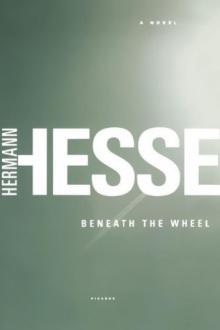 Beneath the Wheel
Beneath the Wheel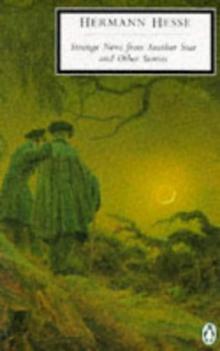 Strange News From Another Star
Strange News From Another Star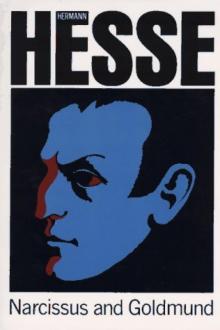 Narcissus and Goldmund
Narcissus and Goldmund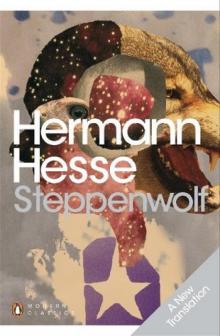 Steppenwolf
Steppenwolf Siddhartha
Siddhartha Demian
Demian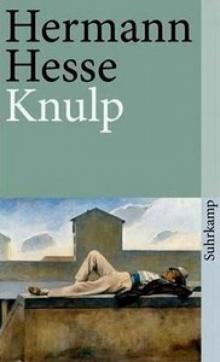 Knulp
Knulp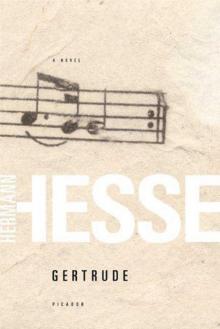 Gertrude
Gertrude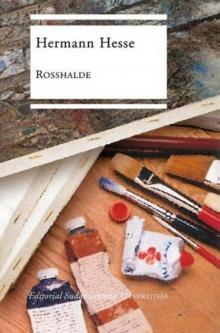 Rosshalde
Rosshalde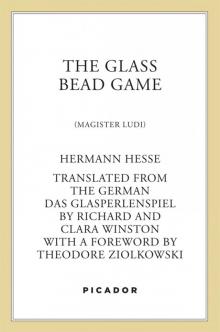 The Glass Bead Game
The Glass Bead Game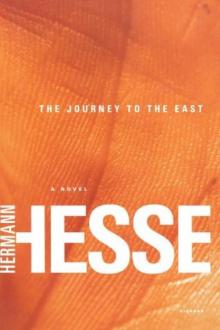 The Journey to the East
The Journey to the East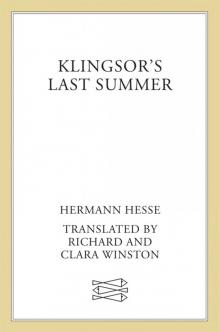 Klingsor's Last Summer
Klingsor's Last Summer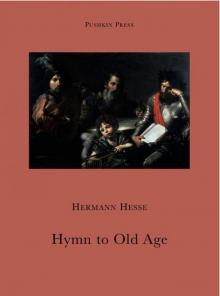 Hymn to Old Age
Hymn to Old Age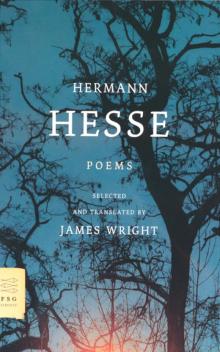 Poems
Poems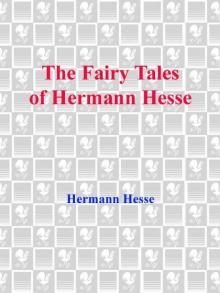 The Fairy Tales of Hermann Hesse
The Fairy Tales of Hermann Hesse Singapore Dream and Other Adventures
Singapore Dream and Other Adventures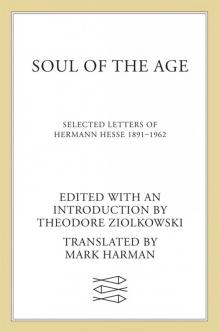 Soul of the Age
Soul of the Age